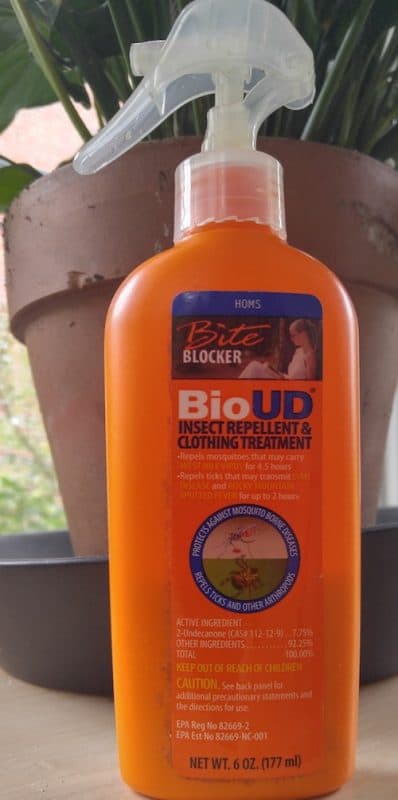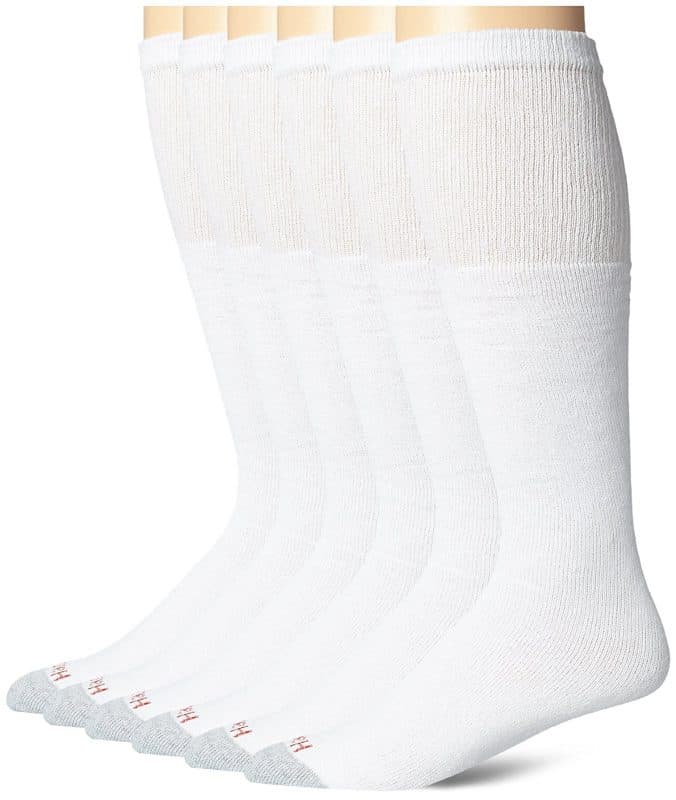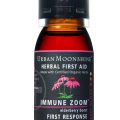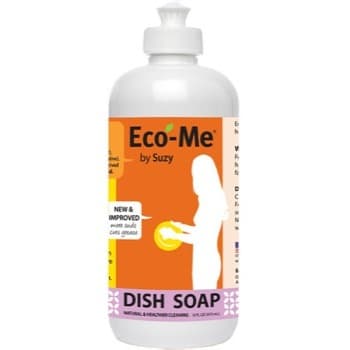
By John, Certified Holistic Health Coach
If you know us by now, you know that we are always trying to find products and solutions that keep toxins away from our homes and families.
Sometime there are problems difficult enough to make us pay even closer attention. A good example of this is the problems with ticks and the diseases they spread.
Ticks & Pets
We walk our new puppy, Koa, twice a day. There is a great park nearby with a perfect place to take long walks by the river. Koa can be off-leash and we have a great time exploring nature. But nature isn’t always nice.
As Koa explores he runs through tall grass and brush, and ticks are a natural result. We are in the mid-Atlantic and Lyme disease is common.
Because we’d rather deal with these sorts of things in non-toxic ways, we thought that we would use herbal means to discourage ticks. And for simple mosquitos–especially if you’re not in a Zika-prone area, we like Green Goo’s Buge Be Gone product. (My wife, Suzanne, actually only uses this repellent and has not yet gotten any ticks!). But does non-toxic bug spray for ticks really work?

Non-Toxic Bug Spray for Ticks Didn’t Work for (Some of) Us
Unfortunately, the herbal repellents we’ve tried have not been effective enough. Ticks continued to show up on the dog and on me!
The threat of Lyme and other very serious diseases has caused us to reconsider our approach. We take Koa to a holistic veterinarian. She told us that despite all her efforts to avoid typical tick repellents, she has finally decided to use Frontline (which contains the chemical fipronil) on her pets.
If any of you have seen the results of Lyme disease you’ll know that it is not pretty. We know folks who were not diagnosed early enough and they live with very serious disabilities. Lyme is also devastating to dogs–especially labs.
The breeder who sold us Koa is into all organic raw food and holistic care. They even sell an herbal insect repellent. But a few weeks ago they lost one of their dogs to Lyme (liver failure). They sent out an email informing their community that the time had come for them to recommend using standard repellents like Frontline.
We had simultaneously reached the same conclusion.
 Why We Use Frontline
Why We Use Frontline
I have read on many websites that fipronil will potentially cause a wide range of maladies, and there is no doubt that it is worth being concerned about. The problem is that there are simply no good scientific studies showing an “all natural” solution.
Yes, there seems to be a lot of anecdotal evidence to warrant concern. There is, however considerable evidence that fipronil works and does not present an imminent threat to a healthy dog. Many folks in the holistic world disagree.
It is a difficult choice, but having spent decades in the northeast, we have seen Lyme disease up close and for us the stakes are simply too high. The choice is between something of concern and something far worse.
Koa is 4 months old. We expect to walk him out in nature for the next 15 years. Statistically, there is zero chance that he will not, at some point, come home with a tick that carries the spirochetes that produce Lyme disease. In fact, it is far more likely that he has already had at least one such tick on him. With 5 grandchildren who play with Koa, it is important that they too are protected. And speaking of people….
Ticks & Humans
Not only have we gone to the dark side and started using Frontline for Koa, but I’ve also started using Off! to protect myself. Yes, DEET is the Bad Stuff. But Lyme is worse and I’m just not convinced that herbal repellents are effective. Maia is also using Off! on her kids when they are in tick-heavy areas.
Here’s how we try to make my use of Off! a little less toxic:
- We don’t use the aerosol spray, but instead the spritz bottle.
- We try to mostly spray on clothing to avoid putting the stuff directly on our skin.
- We only apply it in well-ventilated areas (outside) and do our best not to breathe it in.
- We get the formula that isn’t loaded with a bunch of other toxins (synthetic fragrances, etc.).
Tips for Preventing Lyme Disease
You probably already know that you should check yourself and your children meticulously after being out in tick-heavy areas (having blond kids makes this easier!). Ticks don’t like cold water, so jumping in a pool after a hike through the woods is a good idea, as is taking a cold shower. You should launder any clothing that you’ve worn outside (or at least run through the hot dryer).
Here’s what else we’ve purchased to prevent getting bitten by ticks:
- A lint roller to run over your body when you come inside (this can grab ticks that haven’t yet dug in).


- A natural loofah to use in the shower after coming indoors (this can scrape off ticks you haven’t seen).
- Tall white socks to tuck pants into when walking outside (this makes it easy to spot ticks you might pick up).
- Permethrin to use on your clothing, which will last through up to six washes (and yes, this is also a chemical!).
- Tick-repellent clothing, which is good for up to 70 washes.
We’d love to hear your solutions to this difficult problem. For now we are living with the lesser of two evils.
Stay sane,

P.S. There is one less toxic bug spray on the market that looks promising, but about which I haven’t learned enough to make an official recommendation. BioUD’s Insect Repellent is derived from a tomato plant and appears to be extremely effective at repelling ticks as well as mosquitos. Users do complain of the smell, but I just bought a bottle and am going to give it a try. Maybe this is the non-toxic bug spray for ticks that we’ve all been waiting for!
P.P.S. If you are only worried about mosquitos and not ticks, Maia wrote about Zika protection here.
If you liked this post, sign up for our newsletter to be alerted when we publish new content like this!

 Why We Use Frontline
Why We Use Frontline








Liz says
Feet about the oral tick repellents for dogs? I have an 8.5 month old who loves running his hands through our dogs hair. I wouldn’t want my son getting in contact with the frontline, especially since those fingers end up in his mouth…?!
Ksen says
Following this comment as I am interested in knowing your thoughts on oral tick repellents – was just going to purchase Nexgard for both of our dogs. Also, have you tested Wondercide products? We have had great success with them.
John says
I just found the following on a blog reviewing Wondercide…
“I just finished a conversation with Meredith at Wondercide. I am a little disappointed and thought I’d share what I learned.
I recently purchased $50 worth of EcoTreat and $70 for beneficial nematodes hoping I would be able to kill whatever ticks may be in my yard. The Wondercide website states their EcoTreat outdoor pest treatment is not harmful to beneficial insects. When I asked about nematodes she said they did not have any data to suggest it is safe for beneficial nematodes.
I’ve used the indoor Wondercide spray and it does kill ticks if you get them with a direct hit but residual action is pretty poor.”
Francesca says
I’m sorry but every time you come back check for ticks. Using deet is absolutely NOT the way to go. I’m shocked that you are recommending it in any form. You can use Tea Tree, Eucalyptus, a good, organic brand, put 15- 20 drops in a small spray bottle, add water and spray around feet and ankles and spray on the dog too. Also CIDER VINEGAR around feet and ankles and sprayed on dog will keep them away.
Ally says
Some ticks that transmit Lyme’s are barely the size of a poppy seed. They can be almost impossible to spot during ‘tick checks’ on a person, nevermind a dog covered in fur.
John says
Hi Folks, John Here…
I am, by no means, an expert on this subject. There are many choices when it comes to tick protection: Frontline type, oral versions, various collars, herbal sprays etc.
We have a holistic veterinarian who is also an expert on Chinese medicine for pets…(accupucture, herbs etc.) She has tried many different herbal ad essential oils repellants, with only modest results. She finally turned to Frontline because the stakes are so high and she was not getting the results she’d like with the herbs and oils.
Some folks have great success with oils like tea tree and eucalyptus. We think that’s great.
One of our problems is that Koa is a labrador retriever and the walk we take him on twice per day is along a river. He spends a lot of time in the water and I’m pretty sure that the herbal sprays are greatly diminished as he swims and splashes around.
We understand that some folks would never use anything like Frontline and to an extent we totally get understand why you might arrive at that conclusion.
Every time I read more on the subject I start leaning away from the use of Frontline. But every time I meet a dog owner whose dog died of Lymes, or a person who has Lymes, I become convinced that Lymes is worse than Frontline. It is with almost 100% certainty that within our location, it is almost 100% certain that ticks carrying a serious disease will attach to Koa (and me).
This is just one of those occasions where the answer is not clear. It comes down to a choice between two imperfect outcomes.
Charles Kroeger says
growing up in central texas we had problems with deer ticks and chiggers. there was the occasional grey tick the ones that swell up and usually get on your dog but it is not unknown to have one yourself. the tried and trusted method was to paint the edges of your shoe soles with kerosene. it’s not as bad as you’re thinking. it has a strong odor of course but that’s why you want it down there on the ground. it is quite effective.
Julie says
Kudos to you for raising lyme awareness. Permethrin is definitely the way to go. I’m from PA and my sonis an avid outdoorsman. He never has ticks on him–ever. In addition- I made him throw his clothes in the dryer for ten minutes upon entering. It kills any unseen buggers. At first he was annoyed. It now he’s used to the routine. We also get our yard treated.
John says
I’m not judging anyone’s choice but a permethrin product disabled my girl/friend after she used this in her home. She was trying to get rid of fleas. She spent the next 3 years bedridden with chemical injury and somewhat recovered later, only then to develop an auto-immune disease. My neighbors are treating their lawns here and 2 of them who use very toxic lawn insecticides have stage 3 cancers, one is a very aggressive cancer. Their kids and pets play in the lawn even before the product is dry. It is a chemical injury waiting to happen. Permethrins attack the central nervous system. This is their way of killing the insect and in the interim, can and do initiate nervous system damage in human beings. I suffered nervous system damage and I can tell you it’s not pretty. There is a real viable risk that I just want to make known so others will not become chronically ill like I have been for 8 years. As a side note, my cat almost died after severe convulsions brought on by a flea/tick medication.
Maia James says
Wow, John, we are so sorry to hear about your girlfriend’s awful reaction to Permethrin! (And for your neighbors, and for your cat!) .
John says
I prefer to stay out of tick infested areas rather than risk the potentially harmful and disabling consequences of Deet. But everyone has to make their own choices, but understand there are always consequences and sometimes the risk is better than the chemical. I guess it’s the same with the vaccine scandal going on now.
This excerpt is from Dr. Mercola’s website on Deet.
Why DEET-Containing Repellents Are Better Off Avoided
About 30 percent of Americans use DEET every year, but you should know that this chemical – though generally effective in keeping away insects – can have deadly repercussions. From 1961 to 2002, the Agency for Toxic Substances and Disease Registry reports eight deaths related to DEET exposure.
Three of these resulted from deliberate ingestion, but five of them occurred following DEET exposure to the skin in adults and children.3 Psychological effects have also been reported including altered mental state, auditory hallucinations, and severe agitation.
In children, the most frequently reported symptoms of DEET toxicity reported to poison control centers were lethargy, headaches, tremors, involuntary movements, seizures, and convulsions. Further, in a study of more than 140 National Park Service employees, 25 percent reported health effects they attributed to DEET, including:4
Rashes
Skin or mucous membrane irritation
Transient numb or burning lips
Dizziness
Disorientation
Difficulty concentrating
Headache
Nausea
Concerened says
What about people withb epilepsy who can’t use Deet or even be around It? My brother has epilepsy from a rare syndrome and my dog has epilepsy as a vaccine injury. How then should I choose whether to use a toxic chemical or not?
Disaster waiting to happen. We use wondercide and it works great on us, and pretty well oon dogs, but not as effective as if like due to their hair length. They have coats that repel liquid treatments and pills make them both severely sick/vomit/lethargy.
Dody says
Two additional strategies I use and recommend:
1. I previously used oral Nexgard, very successfully. But my dog has developed a mild seizure disorder, which makes Nexgard contraindicated. She now wears a Seresto collar. It lasts 8 months, reportedly emits a very low level of toxin continuously, and can tolerate getting wet occasionally. We live in a very heavily tick-infested county in Massachusetts, where Frontline Plus lost effectiveness which was why we went to Nexgard before the seizure issue came up. Effective tick control is essential here. My vet’s office sees several new cases of full-blown Lyme disease every month of the year.
2. For dealing with human exposure to ticks, I employ the simple strategy of dumping all my clothes (except underwear which I inspect carefully) into the clothes dryer immediately after coming back in the house. I run it on medium for 45 minutes; 30 minutes on high is also recommended. I have NEVER found a tick on me when I follow this procedure. Ticks hide in the seams of our clothes until we quiet down after our outings. They then tiptoe around seeking the richest source of blood they can find, preferably in a nice moist part of our body. They tolerate moisture well–can even survive a full washing machine cycle. But they dessicate in dry heat.
I have had acute Lyme disease twice, both times after having ticks attached for a maximum of eight hours, and followed the standard-of-care 3 weeks of doxycyclene. Nevertheless I later developed post-Lyme syndrome which nearly killed me and from which I am gradually healing on an experimental protocol. I agree with your approach. Lyme disease, and the other diseases black-legged ticks are now increasingly carrying, are nothing to take chances with.
John says
Hi Dody,
I’m so sorry for your recurring bouts with Lymes!
Yes, the dryer is the way to go…but if a spirochete-bearing tick happens to attach itself to you before you can kill it…well…you know the rest of the story better than I do.
If you do any camping it is simply unreasonable to strip down every hour, conduct a full body scan, change clothes etc etc. Not going to happen! Various oils can be a good first line of defense but if (when) a tick slips through you’ve got a big problem…as you well know.
Natalie Haneberg says
There is a reason I subscribe to Gimme The Good Stuff. It is not based on merely anecdotal evidence (which yes, can absolutely be right, but also can be wrong) but also scientific evidence and/or scrutiny thanks to Maia, her husband, and parents. I consider myself one who “straddles both worlds.” As an RN, I’ve been trained to eye everything with doubt unless backed by rigorous testing, clinical trials, and scholarly review. However, we also at times have evidence that shows otherwise (here’s where anecdotal evidence comes into play).
I hate bug spray. But I live in Hawaii. Luckily, we don’t have a threat of Zika or Lyme here…yet. At this time we choose to use nothing most of the time, and occasionally an essential oil based repellant when for example, going on a hike at dusk. But I WILL NOT HESITATE to use the nasty stuff if my family or pets will be at risk of the real bad guys. If I’m ever up there in New England or in the south where Zika has been found, you bet I’m using DEET.
I agonized and lost sleep over giving my dog a pesticide to avoid ticks. But she has had 2 life threatening tick diseases (ehrichiosis and babesiosis) that I don’t want to go through again. Also, she lives in the house (small dog) and we have a small child so it is even more imperative that we keep her tick free.
Thank you John, for this article, discussing smart ways to use these chemicals while reducing exposure, and also thanks for helping me choose a bed for my son.😊
John says
Hi Natalie,
John here…
Yes…Hawaii has plenty ticks but no Lymes…YET. I hope, like snakes, that it never gets there because as a kid growing up on Oahu, picking ticks off our dog was a daily routine.
I think the rabies quarantine helps keep Lymes away.
Hawaii is an unusually safe place (unless you boogie board!) 🙂 Stay there! But if you ever do come east, be sure to come see us! Kamaaina discount!
Beth says
I have been using the Seresto collar on my dog for several years and have found it to be very effective for repelling fleas, ticks, and lice. I do remove the collar when I bathe my dog. It’s protection lasts for 8 months.
maia says
Awesome! Thanks for the tip…
Mary says
Would you feel comfortable using feet during pregnancy?
Mary says
Oops I meant *deet 🙂
Christina says
DEET has been shown to cross the placental barrier. However a pivotal trial show no birth complications/defects in children born to mothers using up to 35% DEET, and animal studies continue to be reassuring. https://www.ncbi.nlm.nih.gov/pubmed/11693870 https://www.ncbi.nlm.nih.gov/pubmed/27548647
It is obviously a synthetic chemical that isn’t meant to be inside our bodies; in line with the theme of this article, it’s about weighing risk/benefits. Eg if you live or travel to a Zika zone, make your decision knowing the scientific evidence: (1) Zika infection is well known to cause permanent and debilitating birth defects. (2) Strong scientific evidence shows no fetal harm, with anecdotal reports to the contrary.
I really appreciate John’s recommendations – if you are in a Lyme/Zika zone and are at risk, use the chemicals ON YOUR CLOTHES as much as possible and avoid using on your skin when you can.
With that being said, I was able to avoid using DEET during my pregnancies, mainly due to timing (post extended freeze weather). I do not live in a Zika zone, and most ticks we have on our property are dog (which rarely carry Lyme), although Lyme is definitely present in our densely deer-populated area. We use a Frontline collar on our pup, who is in the woods daily. I am adamant about being completely organic within reason, and do not allow the use of pesticide/herbicide/fungicides on our property. But if faced with an elevated risk of Zika/Lyme, combined with our outdoor-focused lifestyle, I wouldn’t hesitate to use DEET, even if begrudgingly so.
This is a difficult decision for many, and the best we can do is be well informed. John, I appreciate your rational approach to sharing this information – particularly knowing your readers might object – without being alarmist. Thank you (and your family).
Cindy says
I understand that we have to give in to some bad stuff to protect ourselves and our pets. I have worked with animals most of my life and have made a point of staying away from Frontline. From my experience this product has burnt my pets and i would never use it again. I have used Advantage which seems more gentle.
Natasha says
There is an excellent product called IR3535 that has been used very effectively for years in Europe against ticks. There are other safer options to DEET.